"WZMAK" - That is, an amplifier on 6P6S, ECC82 and EF86
Hello everyone!
I come to you with a project that dragged on for me for almost 4 years - a tube amplifier, which was my school of tube electronics. During this time I made a lot of mistakes, learned a lot and today I can say with a clear conscience that "I already know something". 😊
Initially, this was to be a clone of the schematic-based Ampex 2012, but it soon became apparent that I did not yet know at that time how the input pentode behaved. Its gain was too high in this circuit, which caused problems - the original design was designed for low input amplitudes.
The tubes, transformers and components were already bought, so something of my own had to be designed.
There was also hum and not much power per channel. I dealt with the former by:
- ground in a star topology, very carefully done,
- and using a capacitance multiplier instead of a heavy and expensive choke.
As for the power - the problem was trivial: a badly chosen resistance of the negative feedback loop. After correction - the power was back in place.
⸻
What did I add?
- UL/Pentode mode switch - gives you the opportunity to experiment with the character of the sound.
- Input selector
- Switch between tube rectifier (GZ34) and silicon bridge - the circuit completely disconnects the GZ34, so it doesn't run and wear out.
⸻
Technical extras:
I also used quite a few parts from the 3D printer - the largest being the transformer covers.
I've tried to keep the interior aesthetically pleasing in a spatial style - I'm a big fan of spatial assembly and I think it looks and works great.
⸻
Impressions
- Looks? In my opinion - excellent.
- Sound? Even better.
In my opinion, the pentode mode beats the UL by a whisker - it gives more power and a characteristic "tube hoarseness". The sound is further 'compressed' by voltage drops on the GZ34, which adds to the atmosphere, but only when listening in 'full tube' mode.
⸻
Concluding remark
I've recently noticed a slight 50 Hz hum in tube rectifier mode - I suspect my GZ34 is running out (I've had an incident of sparking in the bulb), although it may also be a matter of some sort of ground loop - but not likely, as the sound is typical of mains frequencies.
So on a day-to-day basis I listen on silicon, but I still plan to play around with a "pseudo rectifier tube" - i.e. two diodes + a power resistor.
⸻
Photos:
📸
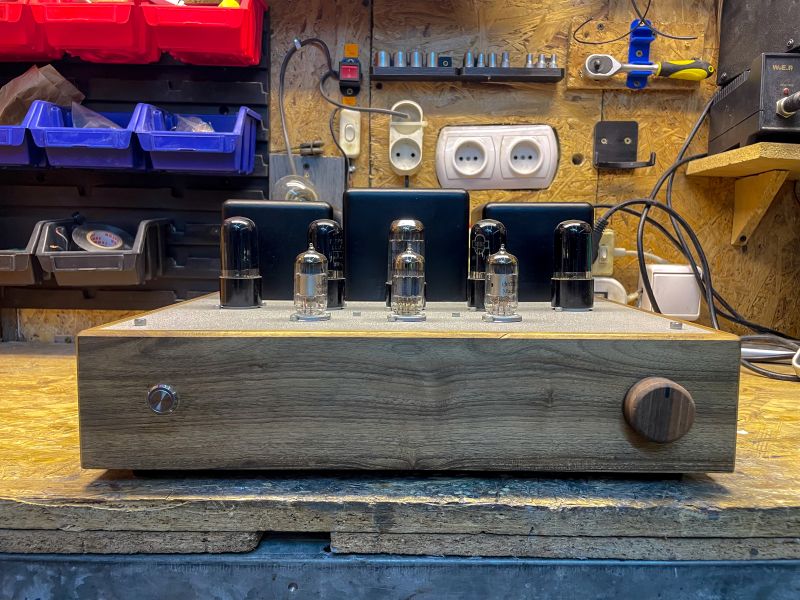 .
.
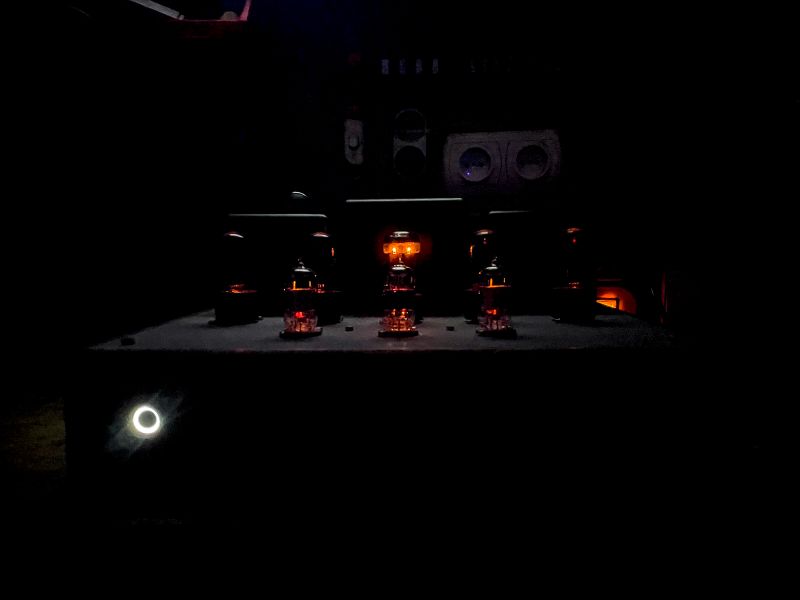 .
.
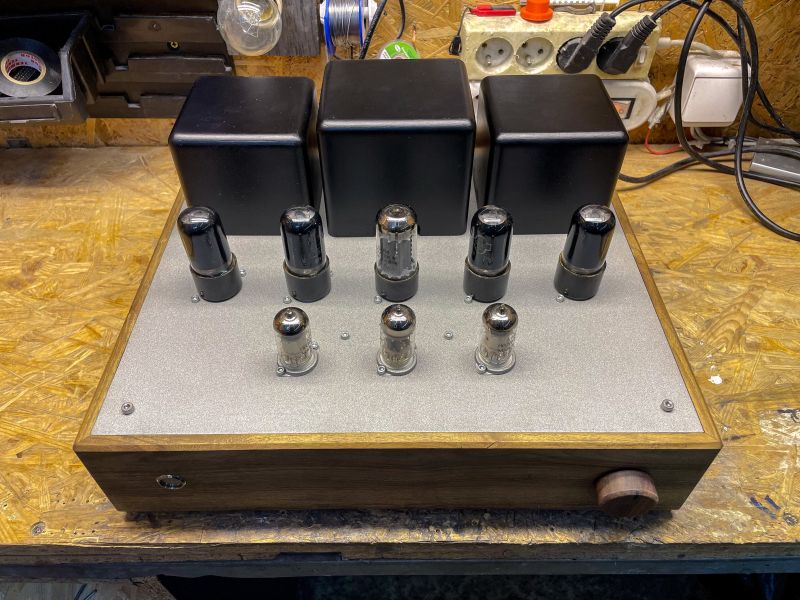 .
.
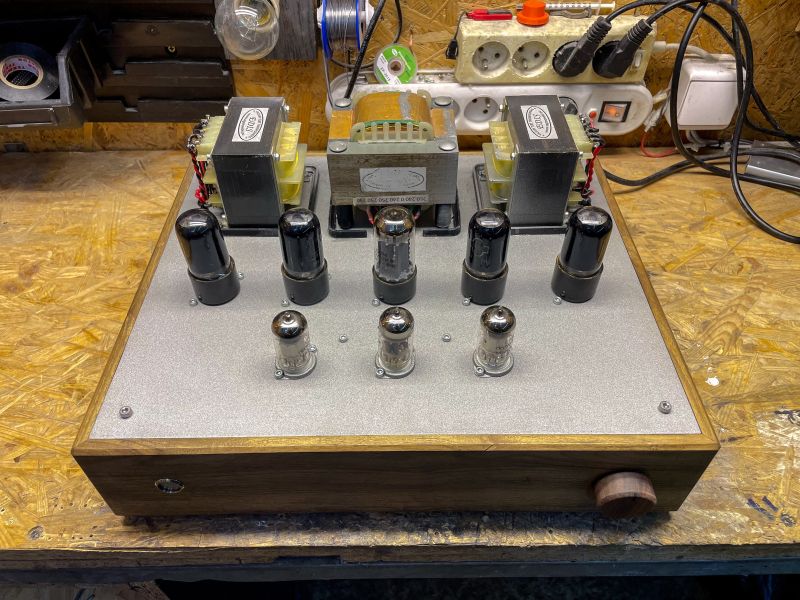 .
.
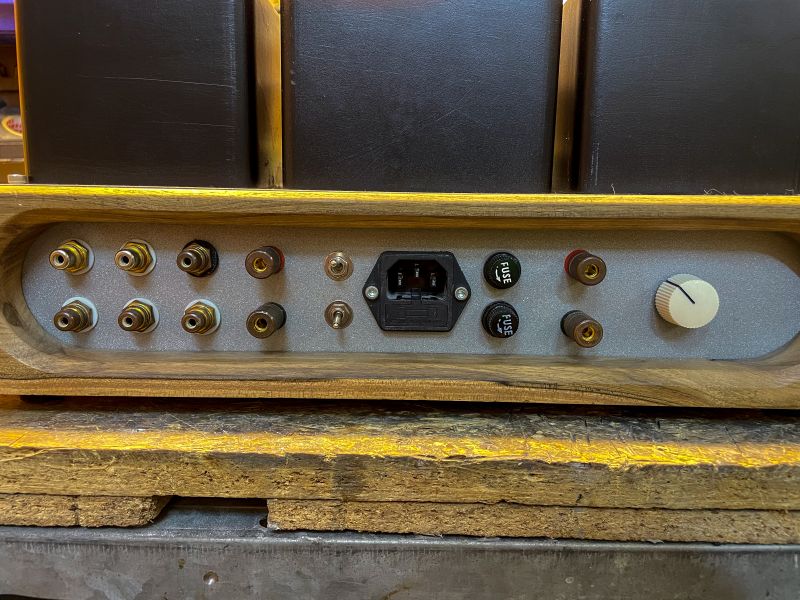 .
.
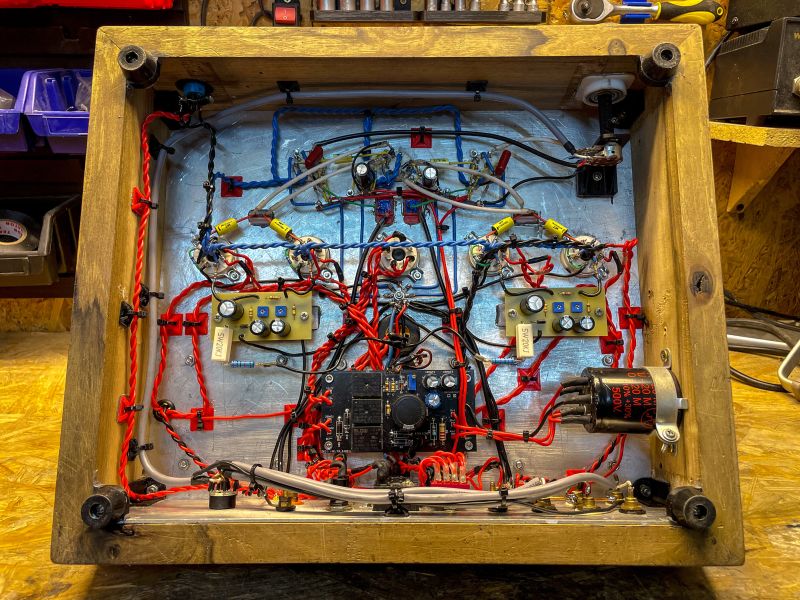 .
.
I come to you with a project that dragged on for me for almost 4 years - a tube amplifier, which was my school of tube electronics. During this time I made a lot of mistakes, learned a lot and today I can say with a clear conscience that "I already know something". 😊
Initially, this was to be a clone of the schematic-based Ampex 2012, but it soon became apparent that I did not yet know at that time how the input pentode behaved. Its gain was too high in this circuit, which caused problems - the original design was designed for low input amplitudes.
The tubes, transformers and components were already bought, so something of my own had to be designed.
There was also hum and not much power per channel. I dealt with the former by:
- ground in a star topology, very carefully done,
- and using a capacitance multiplier instead of a heavy and expensive choke.
As for the power - the problem was trivial: a badly chosen resistance of the negative feedback loop. After correction - the power was back in place.
⸻
What did I add?
- UL/Pentode mode switch - gives you the opportunity to experiment with the character of the sound.
- Input selector
- Switch between tube rectifier (GZ34) and silicon bridge - the circuit completely disconnects the GZ34, so it doesn't run and wear out.
⸻
Technical extras:
I also used quite a few parts from the 3D printer - the largest being the transformer covers.
I've tried to keep the interior aesthetically pleasing in a spatial style - I'm a big fan of spatial assembly and I think it looks and works great.
⸻
Impressions
- Looks? In my opinion - excellent.
- Sound? Even better.
In my opinion, the pentode mode beats the UL by a whisker - it gives more power and a characteristic "tube hoarseness". The sound is further 'compressed' by voltage drops on the GZ34, which adds to the atmosphere, but only when listening in 'full tube' mode.
⸻
Concluding remark
I've recently noticed a slight 50 Hz hum in tube rectifier mode - I suspect my GZ34 is running out (I've had an incident of sparking in the bulb), although it may also be a matter of some sort of ground loop - but not likely, as the sound is typical of mains frequencies.
So on a day-to-day basis I listen on silicon, but I still plan to play around with a "pseudo rectifier tube" - i.e. two diodes + a power resistor.
⸻
Photos:
📸
 .
.
 .
.
 .
.
 .
.
 .
.
 .
.


Comments
Congratulations on a successful build! Four years maybe, but you're happy with the sound effect too, and you've learned a lot in the process. And that's what it's all about. I'm guessing that the output... [Read more]
yes it is, these are transformers from Mr Ogonowski [Read more]
. It was probably the gain that was too low and not the power? [Read more]
I too have been lurking lately , to make something more than my test 2xECL86 SE . From my resources I have dug out 4 PCC88 tubes and 4 PCL805 . Too bad I'm missing one PL500 for the PP. On the PCC88 maybe... [Read more]
Congratulations on the design and construction. I like the underside very much. Don't give up on the rectifier tube. Were the transformers specifically chosen for this project? The night photo knocks... [Read more]
Nice design and nice assembly. The overvoltage appearing in the rectifier lamp could be from too high a voltage but it could also be an individual characteristic of the lamp. I once had such adventures... [Read more]
These lamps on Allegro now almost at the price of a bottle of natural sourdough for Christmas borscht, I have a lot, zero interest although prices tiny. [Read more]
So I might ask , is it worth putting together a clone of such a Meloman 25 ? How did the original compare in terms of sound ? [Read more]
exactly, too little gain to drive a load with 12 watts from the datasheet ;) . bb2168d2d Added after 6 [minutes]: it's a pity that PCC88 is not the same as ECC88 just for a different voltage, but... [Read more]
Why the input selector on the back? Could you throw in a diagram of this amp as I can see quite a few differences from the original. [Read more]
this is entirely my design, in the sense that it was originally going to be Ampex but however I redesigned it my way :p [Read more]
. Apart from the series glow , what is the difference between PCC and ECC ? The same as the PCL86 from the ECL 86 . Maybe in the tide of time I will assemble some preamp with tone control on these PCC88s... [Read more]
Hello For dual triodes, the differences are only in the glow parameters. The ECL86 and PCL86 tubes also have different characteristics due to the supply voltages of the circuit for which they were... [Read more]
. This is where you are wrong, these are identical tubes in terms of characteristics, they only differ in their glow parameters. Perhaps you are confusing this with a pair of PL84 and EL84? Because... [Read more]
Very nice construction, thanks for the presentations! How long did it take to build? Write me a PW with the Parcel Post and I'll send a small gift. [Read more]
Thanks a lot! After redesigning without looking for any more shortcomings I think with all parts about a month. A bit long, but that's because I'm actually doing everything myself, apart from the case,... [Read more]
Strange this resting current control. The potentiometer sliders are connected in parallel. No matter how you spin them, the voltage on the first grids of both tubes - more or less - will still be the same.... [Read more]
In my opinion, the diagram probably contains errors. I don't know what the component values are, but according to this diagram, the V2A lamp of the phase inverter should not work at all. I also don't... [Read more]
fact, I had forgotten about this capacitor, but it seems to me that the cause of the 50hz is different purely visual, I wanted the front to be minimalist ;) . Added after 6 [minutes]:3298872ee... [Read more]